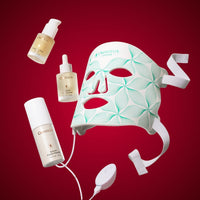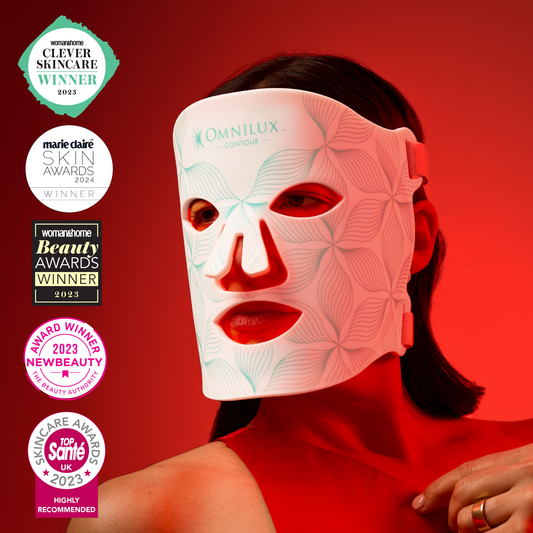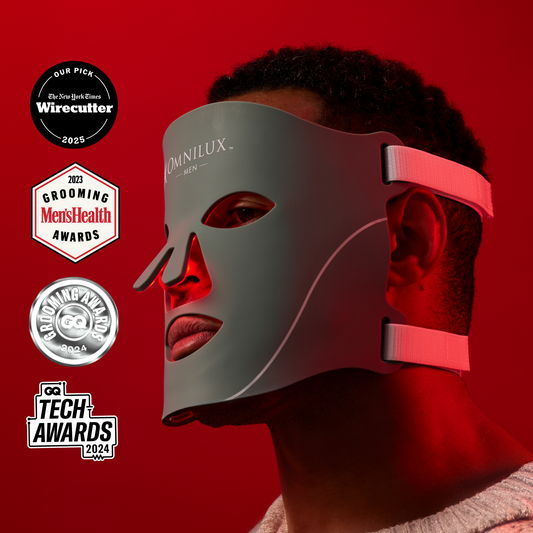
Could Your Shower Water Be Damaging Your Skin? The Link Between Water and Skin Health
Many of us think of skincare as what happens after stepping out of the shower. However, did you know that the quality of your shower water could be influencing your skin’s health more than you realize?Filtering your water before it reaches your skin can protect against irritation, redness, acne, and even signs of aging. Follow it up with an at-home LED light therapy session plus a solid topical skincare routine, and you can safeguard against all types of skin concerns!
Identifying Skin Irritants in Water
The tap water that supplies your shower can contain multiple skin irritants, including heavy metals, chlorine, chromium, calcium, and magnesium. While you shower, the warm water opens your pores, allowing these irritants to permeate your skin.
Unfortunately, in the quest for soft, supple skin, these contaminants can be detrimental.
-
Chlorine is one of the most common irritants in shower water, as the EPA requires trace amounts of it in municipal water for disinfecting purposes. Unfortunately, chlorine also strips the skin of its natural oils, leaving the skin barrier compromised. Over time, this can lead to dryness, itchiness, eczema flare-ups, redness, and premature skin aging.
-
Heavy metals such as cadmium, nickel, mercury, and even arsenic are often found in tap water. In your shower, these metals combine with your skin’s oils, giving them a waxy texture that can clog pores and even cause acne breakouts. Heavy metals can also increase free radicals and oxidative stress in the skin, leading to damaged collagen.
-
Chromium is an essential trace mineral that your body needs for blood sugar regulation. However, when your skin is repeatedly exposed to it in the shower, chromium can trigger skin irritation, redness, and scaling.
- Calcium may help keep our bones strong, but when it’s in our shower water, it can disrupt natural oil levels. This can trigger skin dryness, redness, and itchiness. Along with magnesium, calcium can also react with fatty acids in soaps, leaving a residue on your skin’s surface. This residue can disrupt the skin’s protective barrier, making it more susceptible to environmental irritants.
According to board-certified dermatologist Dr. Jared Jagdeo, MD: “Our skin is extremely sensitive to chemicals, minerals, and contaminants in water – these substances can cause damage to our skin and hair and are often associated with clogged pores, blemishes, dryness, aging skin, breakage and more.”
The Importance of Filtered Water for Skin Health
When you consider how often you shower, your exposure to skin irritants may be startling. In the long haul, shower water contaminants can irreversibly damage your skin, leading to premature skin aging and sensitivities like eczema.
Thankfully, there’s a simple way to shield your skin: a shower filter! This type of filter can be seamlessly secured to your showerhead, filtering out contaminants before they reach your skin. Dr. Jagdeo notes: “It is important to remove [skin] triggers from our water as much as possible and I often recommend my patients use filters, such as a showerhead filter, to eliminate damaging substances.“
But, not all shower filters are created equal. Here are some features to look out for:
- Meets or exceeds NSF standards for water treatment systems
- Third-party lab testing for proven results
- Doesn’t reduce water pressure
- Universal fit (with this feature, you don’t have to worry about whether or not the filter will work with your shower)
Want to keep it simple? Opt for the Filtered Showerhead from Jolie, our go-to for dependable, skin-saving filtration. It meets all of the qualifications above, and then some!
LED Therapy as Part of Your Post-Shower Routine
To carry forward the benefits of filtered shower water, consider the benefits of LED therapy. As Dr. Jagdeo puts it:
“It is important to note that it is nearly impossible to remove all sources of inflammation from the water used for cleansing, which is why I always recommend my clients integrate the Omnilux Contour LED mask into their routine to help improve the skin barrier and overall appearance and wellness of the skin as part of a healthy skin regimen, in combination with in-office procedures and topical treatments as needed.”
LED light therapy with red and near-infrared light is clinically proven to help with skin inflammation and signs of aging by stimulating new collagen production on a cellular level. Blue light can also be used to eliminate acne-causing bacteria on the surface of the skin, helping to curb current and future breakouts.
After stepping out of your filtered shower and gently drying your skin with a clean towel, apply an Omnilux Mask (or Mini for a more targeted treatment) for 10 minutes. The light wavelengths will soothe and strengthen your skin from the inside out, enhancing the benefits of your showerhead filter.
Whether you’re struggling with acne, dry skin, wrinkles, or simply chasing more radiant skin, a shower filter and LED therapy can work together to enhance your skin. Try adding these tools to your skincare regimen and see the difference that clean water can make!










